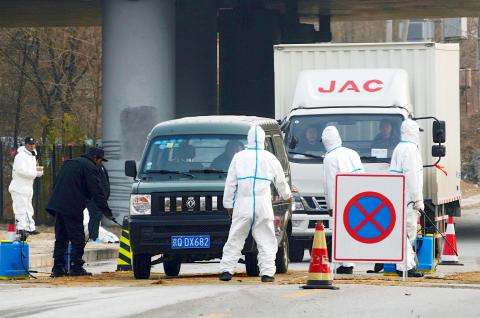A case of African swine fever has been detected at a Hong Kong slaughterhouse, prompting the culling of all 6,000 pigs at the facility.
Hong Kong Secretary for Food and Health Sophia Chan (陳肇始) said in a statement on Friday that the incurable virus was found in a single pig imported from a farm in Guangdong Province in mainland China, where the months-long outbreak has devastated herds.
Pork is China’s staple meat, and its price and availability is considered a matter of national concern. Shortfalls in supply have increased demand for pork from producers in the US, with whom China is in a trade dispute.

Photo: Reuters
The culling was necessary so that “thorough cleansing and also disinfection could be conducted,” Chan said.
Operations at the Sheung Shui Slaughterhouse would be suspended until the disinfection work is completed, she said.
“We will enhance the surveillance and also testing of pigs, and currently we collect samples from pigs with ASF symptoms for testing, and in the future we will step up the sampling of other pigs for testing,” Chan said, using an acronym for the disease.
The territory’s supply of fresh pork would be reduced in the near future, but there would still be a limited supply of live pigs available from another slaughterhouse, she said.
Unlike swine flu, African swine fever cannot be transmitted to humans.
Well-cooked pork is safe for consumption, Chan said.
Concerns about the spread of African swine fever to the US has led organizers to cancel the World Pork Expo scheduled for next month in Iowa.
Denmark has begun erecting a 70km fence along the German border to keep out wild boars in an attempt to prevent the spread of African swine fever, which could jeopardize the nation’s valuable pork industry.
Russia has also been hit hard by the disease and some have speculated that the Chinese outbreak might have originated among pigs from that country.

CHAOS: Iranians took to the streets playing celebratory music after reports of Khamenei’s death on Saturday, while mourners also gathered in Tehran yesterday Iranian Supreme Leader Ayatollah Ali Khamenei was killed in a major attack on Iran launched by Israel and the US, throwing the future of the Islamic republic into doubt and raising the risk of regional instability. Iranian state television and the state-run IRNA news agency announced the 86-year-old’s death early yesterday. US President Donald Trump said it gave Iranians their “greatest chance” to “take back” their country. The announcements came after a joint US and Israeli aerial bombardment that targeted Iranian military and governmental sites. Trump said the “heavy and pinpoint bombing” would continue through the week or as long

TRUST: The KMT said it respected the US’ timing and considerations, and hoped it would continue to honor its commitments to helping Taiwan bolster its defenses and deterrence US President Donald Trump is delaying a multibillion-dollar arms sale to Taiwan to ensure his visit to Beijing is successful, a New York Times report said. The weapons sales package has stalled in the US Department of State, the report said, citing US officials it did not identify. The White House has told agencies not to push forward ahead of Trump’s meeting with Chinese President Xi Jinping (習近平), it said. The two last month held a phone call to discuss trade and geopolitical flashpoints ahead of the summit. Xi raised the Taiwan issue and urged the US to handle arms sales to

BIG SPENDERS: Foreign investors bought the most Taiwan equities since 2005, signaling confidence that an AI boom would continue to benefit chipmakers Taiwan Semiconductor Manufacturing Co’s (TSMC, 台積電) market capitalization swelled to US$2 trillion for the first time following a 4.25 percent rally in its American depositary receipts (ADR) overnight, putting the world’s biggest contract chipmaker sixth on the list of the world’s biggest companies by market capitalization, just behind Amazon.com Inc. The site CompaniesMarketcap.com ranked TSMC ahead of Saudi Aramco and Meta Platforms Inc. The Taiwanese company’s ADRs on Tuesday surged to US$385.75 on the New York Stock Exchange, as strong demand for artificial intelligence (AI) applications led to chip supply constraints and boost revenue growth to record-breaking levels. Each TSMC ADR represents

State-run CPC Corp, Taiwan (CPC, 台灣中油) yesterday said that it had confirmed on Saturday night with its liquefied natural gas (LNG) and crude oil suppliers that shipments are proceeding as scheduled and that domestic supplies remain unaffected. The CPC yesterday announced the gasoline and diesel prices will rise by NT$0.2 and NT$0.4 per liter, respectively, starting Monday, citing Middle East tensions and blizzards in the eastern United States. CPC also iterated it has been reducing the proportion of crude oil imports from the Middle East and diversifying its supply sources in the past few years in response to geopolitical risks, expanding